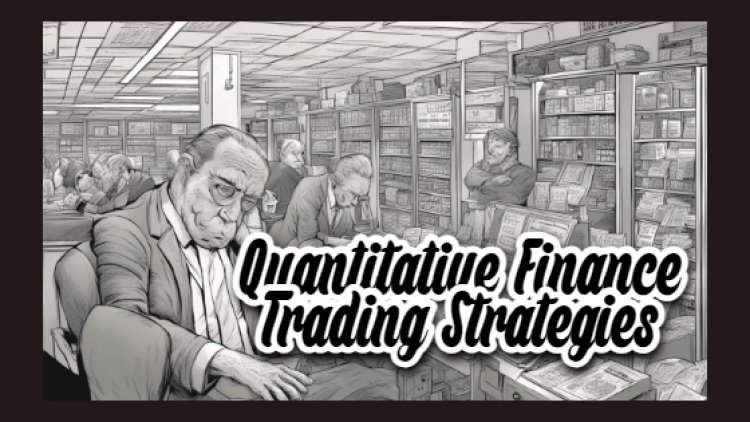Quantitative Finance Trading Strategies
Quantitative financial trading approaches rely on market data trends and high-frequency trading, with performance determined by the accuracy of the models, data quality, and risk management.

Quantitative Finance Trading Strategies
Quantitative financial trading approaches rely on market data trends and high-frequency trading, with performance determined by the accuracy of the models, data quality, and risk management.
"The stock market is full of people who know the price of everything but the value of nothing."
Mr. Philip Fisher
Application of mathematical models: Quantitative finance relies heavily on mathematical models to predict market movements and make trading decisions. These models, which are often based on statistical and probability theories, help traders quantify financial factors and assess risks.
The role of high-frequency trading: High-frequency trading (HFT) is an important component of quantitative finance. It uses sophisticated computers to process huge numbers of orders at breakneck speed. HFT strategies rely on complex algorithms that analyze market conditions and execute trades on that basis.
Importance of data quality: The effectiveness of quantitative trading techniques depends heavily on the quality of the data used. Accurate and high-quality data is required to build reliable models and make informed trading decisions. Poor data can lead to inaccurate predictions and potential financial losses.
Risk Management Strategies: Risk management is an important part of quantitative finance. Diversification and hedging are two methods traders use to limit potential losses. These tactics are often incorporated into mathematical trading models.
Influence of Algorithmic Trading: Algorithmic trading has a major impact on quantitative finance. It allows trades to be executed with a speed and frequency that a human trader cannot match. This has led to greater efficiency and profitability in the trading process.
Market Data Patterns: Quantitative finance is about analyzing market data patterns to predict future trends. Traders use techniques such as pattern recognition and machine learning to identify these patterns and make informed trading decisions.
Elements that influence strategy effectiveness: Several elements influence the effectiveness of a quantitative trading strategy. These include the quality of the mathematical model, the accuracy of the data used, and the effectiveness of the risk management strategies employed.
Potential market influence: Quantitative trading systems have the potential to have a significant market influence. They can affect market pricing, volatility, and liquidity. Understanding these potential impacts is important for both traders and regulators.
Phenomenon of the "Flash Crash": The "Flash Crash" of May 6, 2010, is a well-known event in the history of quantitative finance. The Dow Jones Industrial Average dropped over 1000 points in a matter of minutes, only to rebound quickly. This event raised questions about the stability and reliability of algorithmic trading, as it was largely blamed on high-frequency trading algorithms gone awry.
Controversies in Algorithmic Trading: Algorithmic trading has been the subject of various debates. Critics claim that it can create an unequal playing field by giving corporations with more powerful algorithms and faster computers a competitive advantage. There have also been concerns about "quote stuffing," a practice where traders flood the market with orders to confuse other traders and gain a competitive advantage.
High-Frequency Trading Debate: In the realm of finance, high-frequency trading (HFT) is a passionately discussed issue. While supporters believe that HFT increases liquidity and lowers transaction costs, detractors contend that it might cause market volatility and unfair advantages for particular traders. The debate continues, with regulators worldwide grappling with how to oversee this complex and rapidly evolving field.
"Black Swan" Events: "Black Swan" events, or exceedingly unlikely and unpredictable events with large consequences, offer a serious challenge to quantitative finance. These occurrences might result in catastrophic losses for traders who depend largely on statistical models, which frequently fail to account for such anomalies. The 2008 financial crisis is a prime example of a "Black Swan" event.
Artificial Intelligence's Role: Artificial Intelligence (AI) is becoming increasingly significant in quantitative finance. AI algorithms are capable of analyzing massive volumes of data at breakneck speed, making them crucial for high-frequency trading. However, the use of AI also raises ethical and regulatory questions, particularly around transparency and accountability.
Quantitative Trading and Market Manipulation: Quantitative trading systems have been accused of market manipulation in the past. For example, "spoofing" is a contentious technique in which traders make orders with the goal of cancelling them, so producing misleading market signals that favor their own holdings. This practice is illegal, but detecting it can be challenging due to the speed and complexity of algorithmic trading.
Data Quality Issues: The effectiveness of quantitative trading techniques is dependent on the accuracy of the data employed. Obtaining precise and reliable data, on the other hand, might be a substantial difficulty. Issues such as data cleaning, missing data, and data snooping can all impact the effectiveness of a trading strategy.
The Rise of the "Quants": The rise of "quants," or quantitative analysts, has transformed the banking industry. These people, who frequently have expertise in mathematics or physics, employ complicated mathematical models to forecast market movements and make trading choices. However, the "quants" revolution has raised arguments about the over-reliance on mathematical models and the possible hazards to financial stability that this entails.
· The first quantitative hedge fund, Renaissance Technologies, was founded by a mathematician and a former codebreaker.
· High-frequency trading accounts for about half of the stock volume in the USA.
· The "Flash Crash" of 2010 briefly destroyed $1 trillion in market value.
· Quantitative finance is a truly global field, with major centers in New York, London, Hong Kong, and Singapore.
· Some quantitative trading firms use artificial intelligence to predict market movements milliseconds before humans do.
· The term "quants" was popularized in 2007 by the book "The Quants" by Scott Patterson.
· Nassim Nicholas Taleb, a former options trader, coined the term "black swan" to describe unpredictable financial events.
· With the rise of quantitative trading, firms are increasingly monitoring execution times in microseconds, resulting in a "race to zero" in terms of trading speed.
Myth: Quant Trading Guarantees Profits – Quantitative trading systems can be extremely profitable, but they do not guarantee profits. Market conditions are unpredictable and even the most sophisticated models cannot account for all variables.
Myth: Math is only for geniuses — Thorough math skills are beneficial in quantitative finance, but not essential. Successful quantitative trading also requires financial knowledge, programming skills and a good understanding of market behavior.
High-frequency trading is unethical, according to popular belief. In the financial sector, high-frequency trading is a legal and common activity. Although it is associated with certain questionable behaviors, it is not necessarily unethical. It is the abuse of the strategy, not the strategy itself, that can lead to unethical results.
Algorithms can reduce the risk of human error in trading decisions, but they are not perfect. Humans construct algorithms that may have errors or biases. They are also unable to account for unpredictable "black swans."
FAQ
How to get started in quantitative trading?
To get started in quantitative trading, you need a solid foundation in mathematics and programming. You need to be familiar with financial markets, statistical analysis, and machine learning methods. Practical experience through internships or entry-level positions in financial or trading firms is also an advantage.
What are the most common quantitative models?
The Black-Scholes model for valuing options, the Capital Asset Pricing Model (CAPM) for calculating expected returns on investments, and Monte Carlo simulation for predicting the probability of various outcomes in a process that cannot be easily predicted due to the intervention of random variables are some popular quantitative models.
How does artificial intelligence affect trade ethics?
AI has an impact on trade ethics because it has the potential to eliminate human error and bias, but it also raises questions about transparency and accountability. For example, AI systems can make judgments faster than humans can comprehend them, leading to unforeseen consequences and dangers.
What does the future of high-frequency trading look like?
High-frequency trading (HFT) will most likely be impacted by legislative changes, technological improvements, and market dynamics in the future. HFT could become more complex and efficient as AI and machine learning become more prevalent, but it could also be subject to stricter rules to prevent market manipulation and ensure fairness.
How do you deal with "black swans"?
Dealing with "black swan" events, which are unpredictable and have serious consequences, requires strict risk management procedures. These include diversifying investments, simulating worst-case situations through stress testing, and having a solid financial base to absorb losses.
What skills are required for algorithmic trading?
Algorithmic trading requires knowledge of programming languages such as Python or C++, knowledge of financial markets and trading concepts, strong mathematical and statistical skills, and knowledge of machine learning algorithms. Because the industry is rapidly changing, problem-solving skills and a mindset of continuous learning are also required.
Okay, Now, check this out…
TradeFxP Features
If you choose to be a self-employed retail trader, here are a few things we offer:
- The best trading Platform
- No Requotes
- Lowest Spreads
- High-level liquidity
- Interbank connectivity
- Pure STP/DMA/ECN
- Free signals
- Best support
- Crypto Wallet and withdrawals / Deposits (USDT)
- Robust CRM
- TradeFxP wallet
- Once click withdrawal
- Multiple payment options
- Local offices to walk in
- Free VPS
- Free Video Chat / Virtual Meetings
- And many more…
If you choose to be a part of our managed account program:
- All of the above +
- 1-2% Daily Profits
- High-level risk management
- Capital protection
- Only 30% of the capital used
- Negative balance protection
- Our fee is from the profits only
- Monthly profit withdrawal
- Wallet system – Use it like Phonepe, or Google Pay
- Crypto wallet and withdrawals / Deposits (USDT)
- Live monitoring
- MyFxbook Live monitoring
- Copy Trading
- And many more…
Optional: If you do not withdraw your profits for 2 months, our system will use those profits to trade and will keep your 100% capital safe and secure for margin purposes. This is optional, and if you choose not to be a part of it, you can withdraw your profits from the first month itself.
Why 1-2% daily? Can't your managed forex account earn more?
Yes, we can! Remember: greed may be good in the beginning, but in the end, it will destroy everything. You and I know that! Many droplets make an ocean! Join the Managed Account Program and sit back for six months, then look at your account. You'll see that our strategy is good and the best. Do you know what I mean?
If you choose to be a part of us as an introducing broker (IB) or channel partner,
- Industry best Rebates
- Local Office support
- Staff support
- Marketing support
- Marketing materials
- And many more…
Having said that….
You can join our Forex Managed Account program and earn 1-2% profits daily. See for yourself by clicking the below link.
Have a great journey, and may you catch some big waves on your way to prosperity!
To see Ai Forex Trading for real, use these credentials.
- Low-risk strategy:
- Mt4: 112018
- Pw: Allah@101
- Server: tradefxp live,
1. To read why you should be with us, click here.
2. To open an account, click here.
3. To see our regulation certificate, click here.
4. To see our news with the IFMRRC, click here.
5. For claims, click here.
6. For the main site, click here.
7. For blogs and articles, click here.
8. Main Website: www.TradeFxP.com



 admin
admin 










